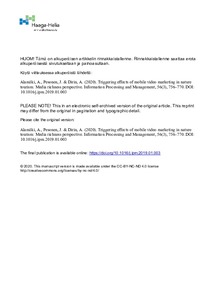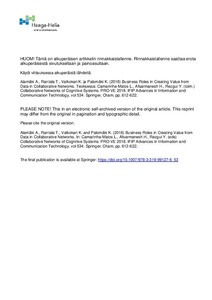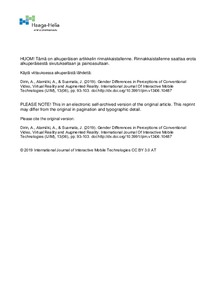Haku
Viitteet 1-10 / 35
Miksi tekoälylle luodaan eettisiä ohjeistuksia?
(Alma Talent, 2022)
Adopting artificial intelligence for the learning and teaching of generation z in higher education
(Haaga-Helia ammattikorkeakoulu, 2021)
The adoption of artificial intelligence (AI) is rapidly growing as a means to enhance learning and teaching in higher education. Previous research on the characteristics of Generation Z students and the opportunities ...
Vastuullinen tekoäly – yritysten yhteiskunnallinen lupaus tekoälyn soveltamiseen
(Laurea-ammattikorkeakoulu, 2023)
Tekoälyn etiikka (Ethics of AI) ja luotettava tekoäly (Trustworthy AI) ovat olleet jo vuosia keskeisiä tutkimus- ja kehitysteemoja tekoälytutkimuksessa. Viime vuosina varsinkin suuret yritykset ovat nostaneet keskiöön myös ...
Interactive Machine Learning: Managing Information Richness in Highly Anonymized Conversation Data
(Springer, 2019)
This case study focuses on an experiment analysing textual conversation data using machine learning algorithms and shows that sharing data across organisational boundaries requires anonymisation that decreases that data’s ...
Triggering effects of mobile video marketing in nature tourism: Media richness perspective
(Elsevier, 2019)
The aim of this study was to investigate videos as potential triggers of behavior. Therefore, we applied the theories of triggers and media richness to learn about the triggering efficiency of mobile marketing videos on ...
Business Roles in Creating Value from Data in Collaborative Networks
(Springer, Cham, 2018)
The present study investigates activities and actors’ roles in how companies utilize and adopt big data and cognitive systems in their business processes. Based on the literature review, a qualitative analysis of 18 in-depth ...
Gender Differences in Perceptions of Conventional Video, Virtual Reality and Augmented Reality
(Kassel University Press, 2019)
The user’s emotional involvement plays an important role in adopting new technologies. The level of engagement with and adoption of new digital applications depends on various personal, contextual, and emotional factors. ...
Analysing the implementation of two distinct pedagogical approaches in higher education institution
(International Academy of Technology, Education and Development, 2015)
This paper aims to reveal the outcomes of two distinct mobile application concept design and development courses at Haaga-Helia University of Applied Sciences. These courses have applied dissimilar pedagogical approaches ...
A Conceptual Model for Knowledge Dimensions and Processes in Design and Technology Projects
(Springer Netherlands, 2018)
The present study sheds new light on the knowledge dimensions and processes that occur when designing new concepts and prototypes in higher education. In particular, this study aims to develop the conceptual understanding ...
AI-based Facial Recognition in Emotional Detections
(Satakunnan ammattikorkeakoulu, 2019)
Facial recognition is a method of identifying a human face with the help of computer vision (CV). The popularity of smart gadgets and the advancement of cameras’ capabilities have caused facial recognition to become a hot ...









